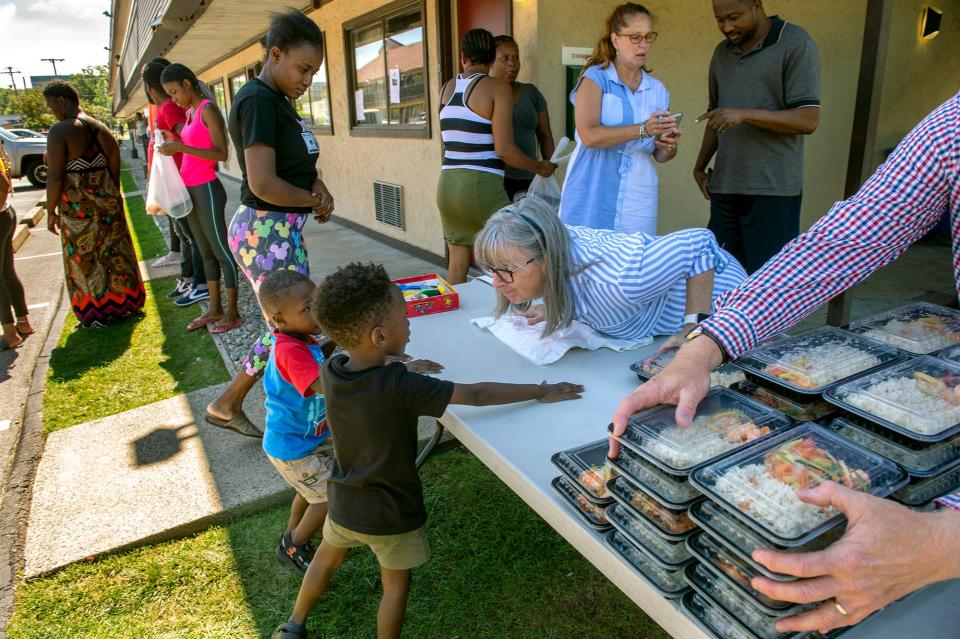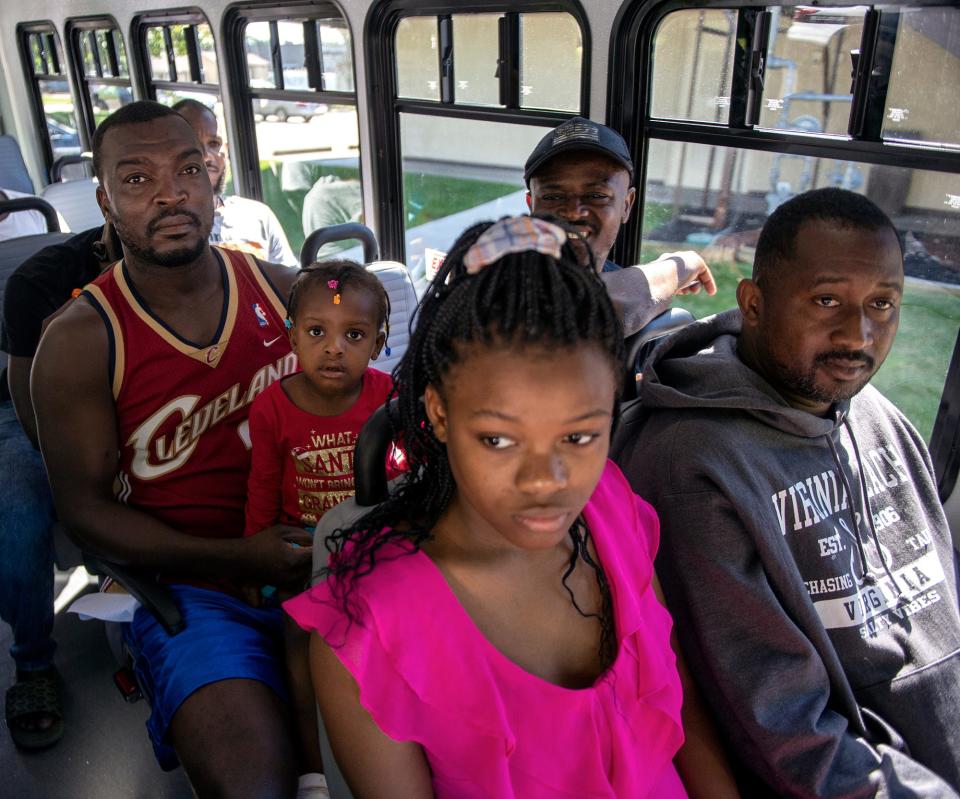Homeless families' stays in shelters could be limited. Some say it would create new issues
FRAMINGHAM — A bill in the State House that would limit the length of time that homeless families would be eligible to stay in emergency housing could have significant ramifications for homeless families currently being sheltered in MetroWest.
Framingham and Marlborough were among the communities that last summer experienced a surge of homeless families being put into hotels being used as temporary shelters. Many of these families, some of whom were asylum-seeking and from Haiti, have remained in temporary housing in those cities, as progress to get them into more sustainable housing has been slow.
The House bill, which passed on March 7, would limit homeless families to nine months in emergency shelters. An additional three months would be provided to those who are either employed or undergoing job training. Pregnant women, people with certain disabilities, veterans and people at “imminent risk” of domestic violence would get an automatic 12 months, according to the bill.
The Senate passed its own, and similar, version of the bill on March 21.

'We want a better life': Haitian asylum seekers share their experiences about coming to Framingham
Massachusetts is the only state in the country that has a right-to-shelter law. The state must provide housing for families with at least one child under age 18. That has made Massachusetts attractive for the homeless population, but also a place where other states send homeless families, knowing they will receive care.
Emergemcy shelter proposal is part of larger appropriation bill
The rules regulating stay for homeless families are part of a larger appropriation bill introduced by the House Committee on Ways and Means, which would earmark $245 million into the emergency homeless shelter system. With a backlog of homeless families in the state — officials said earlier this month there were 783 families on a waitlist to get into temporary shelter — as well as an expectation that demand will continue to grow, legislators said they must make difficult decisions in order to preserve the shelter program's viability.
"It has become crystal clear that the federal government will provide no relief for states like ours who are facing this emergency all over the country," House Committee on Ways and Means Chair Aaron Michlewitz said during a March 20 session. "Washington seems to care more about playing politics on this issue rather than offering solutions for us to implement. That inaction has forced us to make difficult decisions."

The House bill does not contain details about what would happen to families once they stay more than nine months. State Rep. Priscila Sousa, D-Framingham, said the hope is that other mechanisms will be put in place to address this.
"The hope is we have other mechanisms in place where we find long-term solutions, so that somebody isn't completely blindsided at the end of the nine months," shea said. "I'm not saying it is a perfect system, (and) I'm not saying it won't take a tremendous amount of work to make it work."
According to state Senate President Karen Spilka's office, the bill requires that the state's Executive Office of Housing and Livable Communities create guidance for how to exit families from the system, as well as to create a special commission to study the sustainability, effectiveness and efficiency of the shelter system.
Framingham nonprofit head fears homeless families being sent to the streets
For social service agencies working with the homeless community, the prospect of seeing families thrown to the street is terrifying.
Lino Covarrubias is executive director of Jewish Family Services of MetroWest, a nonprofit that has helped settle asylum-seeking immigrants into the state. JFS is managing cases across several MetroWest hotels, working with the South Middlesex Opportunity Council and MetroWest Legal Services to assist people living in temporary housing to become self-sufficient.
Covarrubias doesn't think the average person understands the ramifications of what would happen if families living in emergency housing were to be evicted.

'Looking for work': Why employment for asylum-seeking refugees is a long road in Mass.
"I don't think any municipality in the Commonwealth is ready to see hundreds of families, with children, walking the streets, sleeping on park benches because they are homeless," he said. "We are going to try our best to find housing, and we are really good at it, but what if we can't find permanent housing? A nine-month deadline really scares us. We have been taking care of these families for so long, and now if we are not successful finding them housing in one of the tightest rental markets ever, they are going to be homeless?"
Covarrubias said 90% of the people that JFS has been taking care of have been authorized to work, but that on average, about 60 total work hours per family would be necessary for them to find sustainable housing — even at the most affordable level. Covarrubias said there are some residents who simply "could not make it" outside the shelter system.
"We have single mothers, who have a young child, and they can't work unless someone provides child care for them," he said. "That type of person could not make it outside of the shelter system at the moment."
State Rep. Sousa said House vote was designed to 'mitigate issue'
Sousa, who voted in favor of the House bill, said the decision was difficult, and not one she was excited about. But she said a decision had to be made to help preserve the state's right-to-shelter system.
"Speaking for myself, this a vote I never hoped to have to make, but I understand," Sousa said. "Massachusetts prides itself on being a right-to-shelter state, and unfortunately the way the situation is, certain expectations from Washington haven't been met and that has put us in a really difficult situation. This was a vote that was made to mitigate the issue, without having to reconsider right-to-shelter."

'Lack of communication': Framingham reports about 40 Haitian migrants are staying in city hotel
Sousa added she is wary of pitting marginalized communities against one another, as various populations of homeless residents — from asylum-seeking migrants to domestic abuse victims to the mentally disabled — are in need of limited state resources.
"It's not a matter of the migrants versus victims of domestic violence, it shouldn't be like that, which is why it makes this situation so difficult," Sousa said. "Speaking for myself as a representative, it inevitably ends up being these different communities pitted against one another."
The House bill passed, 121-33; the corresponding Senate bill passed, 32-8. Spilka said the plan proposed by the Senate aims to treat those seeking emergency shelter with respect.
"The plan passed by the Senate today addresses the state’s fiscal reality while also treating individuals who have migrated to our state with dignity and respect,” she said in a prepared statement. “As we continue to navigate through a challenge that has landed on our doorstep because of Congressional inaction, today we are addressing the immediate need to house families, bolstering our existing efforts to support those who have immigrated here in becoming part of our workforce, and providing a roadmap to manage this effort over time."
Eldridge: Healey administration must reduce costs for emergency housing
State Sen. Jamie Eldridge, D-Marlborough, said he believes the Healey administration should be doing more to drive down the cost of emergency housing, as well as create more affordable housing so that families with lower-paying jobs can afford to live in the state.
“I recognize that we need to improve the management of homeless and migrant families," he said. "I’d really like to see the administration better figure out how to reduce the cost of housing so many migrant families. If we could build a whole lot more truly affordable housing, so that families who are working retail jobs and probably earning minimum wage, how can we build housing that is affordable for those people to live in?”
Going forward, the Senate and House will meet to hash out differences in the appropriations bill, which then heads to Healey's desk.
This article originally appeared on MetroWest Daily News: House bill limits families' time in emergency housing to nine months

